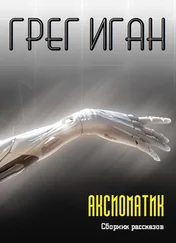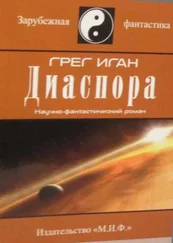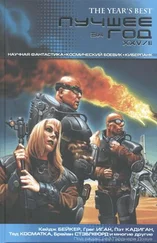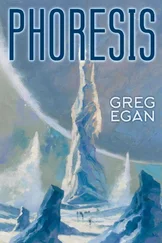Campbell said, “In a sense, the detailed physics isn’t all that important, so long as you accept that ‘one thing’ might not ever be exactly the same as another ‘one thing,’ regardless of the kind of objects we’re talking about. Given that supposition, physical processes that seem to be rigorously equivalent to various arithmetic operations can turn out not to be as reliable as you’d think. With scone-weighing, the flaws are obvious, but I’m talking about the potentially subtler results of misunderstanding the fundamental nature of matter.”
“Hmm.” Though it was unlikely that anyone else Campbell had confided in had taken these speculations as seriously as I did, not only did I not want to seem a pushover, I honestly had no idea whether anything he was saying bore the slightest connection to reality.
I said, “It’s an interesting idea, but I still don’t see how it could speed up the hunt for inconsistencies.”
“I have a set of models,” he said, “which are constrained by the need to agree with some of ‘t Hooft’s ideas about the physics, and also by the need to make arithmetic almost consistent for a very large range of objects. From neutrinos to clusters of galaxies, basic arithmetic involving the kinds of numbers we might encounter in ordinary situations should work out in the usual way.” He laughed. “I mean, that’s the world we’re living in, right?”
Some of us. “Yeah.”
“But the interesting thing is, I can’t make the physics work at all if the arithmetic doesn’t run askew eventually—if there aren’t trans-astronomical numbers where the physical representations no longer capture the arithmetic perfectly. And each of my models lets me predict, more or less, where those effects should begin to show up. By starting with the fundamental physical laws, I can deduce a sequence of calculations with large integers that ought to reveal an inconsistency, when performed with pretty much any computer.”
“Taking you straight to the defect, with no need to search at all.” I’d let the definite article slip out, but it hardly seemed to matter anymore.
“That’s the theory.” Campbell actually blushed slightly. “Well, when you say ‘no search,’ what’s involved really is a much smaller search. There are still free parameters in my models; there are potentially billions of possibilities to test.”
I grinned broadly, wondering if my expression looked as fake as it felt. “But no luck yet?”
“No.” He was beginning to become self-conscious again, glancing around to see who might be listening.
Was he lying to me? Keeping his results secret until he could verify them a million more times, and then decide how best to explain them to incredulous colleagues and an uncomprehending world? Or had whatever he’d done that had lobbed a small grenade into Sam’s universe somehow registered in Campbell’s own computer as arithmetic as usual, betraying no evidence of the boundary he’d crossed? After all, the offending cluster of propositions had obeyed our axioms, so perhaps Campbell had managed to force them to do so without ever realizing that they hadn’t in the past. His ideas were obviously close to the mark—and I could no longer believe this was just a coincidence—but he seemed to have no room in his theory for something that I knew for a fact: arithmetic wasn’t merely inconsistent, it was dynamic . You could take its contradictions and slide them around like bumps in a carpet.
Campbell said, “Parts of the process aren’t easy to automate; there’s some manual work to be done setting up the search for each broad class of models. I’ve only been doing this in my spare time, so it could be a while before I get around to examining all the possibilities.”
“I see.” If all of his calculations so far had produced just one hit on the far side, it was conceivable that the rest would pass without incident. He would publish a negative result ruling out an obscure class of physical theories, and life would go on as normal on both sides of the inconsistency.
What kind of weapons inspector would I be, though, to put my faith in that rosy supposition?
Campbell was looking fidgety, as if his administrative obligations were beckoning. I said, “It’d be great to talk about this a bit more while we’ve got the chance. Are you busy tonight? I’m staying at a backpacker’s down in the city, but maybe you could recommend a restaurant around here somewhere?”
He looked dubious for a moment, but then an instinctive sense of hospitality seemed to overcome his reservations. He said, “Let me check with my wife. We’re not really into restaurants, but I was cooking tonight anyway, and you’d be welcome to join us.”
* * *
Campbell’s house was a fifteen minute walk from the campus; at my request, we detoured to a liquor store so I could buy a couple of bottles of wine to accompany the meal. As I entered the house, my hand lingered on the doorframe, depositing a small device that would assist me if I needed to make an uninvited entry in the future.
Campbell’s wife, Bridget, was an organic chemist, who also taught at Victoria University. The conversation over dinner was all about department heads, budgets, and grant applications, and, despite having left academia long ago, I had no trouble relating sympathetically to the couple’s gripes. My hosts ensured that my wine glass never stayed empty for long.
When we’d finished eating, Bridget excused herself to make a call to her mother, who lived in a small town on the south island. Campbell led me into his study and switched on a laptop with fading keys that must have been twenty years old. Many households had a computer like this: the machine that could no longer run the latest trendy bloatware, but which still worked perfectly with its original OS.
Campbell turned his back to me as he typed his password, and I was careful not to be seen even trying to look. Then he opened some C++ files in an editor, and scrolled over parts of his search algorithm.
I felt giddy, and it wasn’t the wine; I’d filled my stomach with an over-the-counter sobriety aid that turned ethanol into glucose and water faster than any human being could imbibe it. I fervently hoped that Industrial Algebra really had given up their pursuit; if I could get this close to Campbell’s secrets in half a day, IA could be playing the stock market with alternative arithmetic before the month was out, and peddling inconsistency weapons to the Pentagon soon after.
I did not have a photographic memory, and Campbell was just showing me fragments anyway. I didn’t think he was deliberately taunting me; he just wanted me to see that he had something concrete, that all his claims about Planck scale physics and directed search strategies had been more than hot air.
I said, “Wait! What’s that?” He stopped hitting the PAGE DOWN key, and I pointed at a list of variable declarations in the middle of the screen:
long int i1, i2, i3;
dark d1, d2, d3;
A “long int” was a long integer, a quantity represented by twice as many bits as usual. On this vintage machine, that was likely to be a total of just sixty-four bits. “What the fuck is a ‘dark’?” I demanded. It wasn’t how I’d normally speak to someone I’d only just met, but then, I wasn’t meant to be sober.
Campbell laughed. “A dark integer. It’s a type I defined. It holds four thousand and ninety-six bits.”
“But why the name?”
“Dark matter, dark energy… dark integers. They’re all around us, but we don’t usually see them, because they don’t quite play by the rules.”
Hairs rose on the back of my neck. I could not have described the infrastructure of Sam’s world more concisely myself.
Читать дальше









![Грег Иган - Рассказы [компиляция]](/books/419837/greg-igan-rasskazy-kompilyaciya-thumb.webp)
